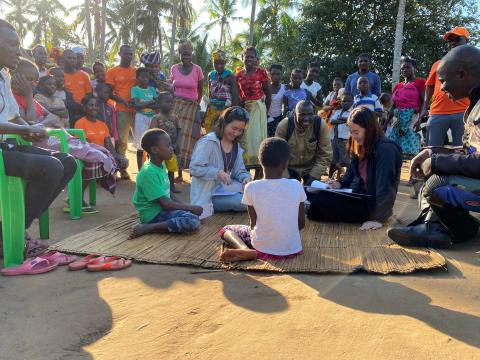What happened after World Vision left? Revisit to a closed Program Area in Mozambique

Through the Sponsorship program, World Vision invests resources in a "program area (AP)" to implement several interventions for 8-12 years until the local community members can sustainably carry these operations forward on their own. Only then does World Vision staff leave, marking the program’s “closure”. Sponsors then receive a Closure Report showcasing the community's achievements and farewell letters from the sponsored children, concluding this transformative journey. Yet, do you ever wonder: What happened afterward? Are the communities doing well?
Since World Vision's community development work is "temporary," to ensure more "sustainability," we regularly review project plans through five key sustainability drivers: enhancing Local Ownership, Partnering, Transformed Relationships, Local and National Advocacy, and Household and Family resilience. The goal is for the community to maintain and continue improving child well-being outcomes after external resources and support leave.
Sustainability is an ideal goal, but once World Vision assesses an AP to be closed and fully withdraws, there is seldom a revisit for subsequent evaluations. It becomes challenging to know if the community is thriving, if the initially established community organizations are still functioning, and other post-exit details. Therefore, the so-called implementation of project "sustainability" remains unknown.
WV Taiwan Returning to a Closed AP in Mozambique After 32 Years
World Vision Taiwan has supported overseas project areas since 1991, with 98 project areas declaring "closure" by 2023. However, World Vision Taiwan had never revisited any closed AP until 2023 when the opportunity arose to revisit the Munhiba AP in central Mozambique. Munhiba AP was supported under WV Mozambique and WV Taiwan’s partnership, the AP started in 2002 and transitioned in 2021. During this ex-post visit, WV Taiwan and Mozambique staff visited the former sponsored child, Health committee, WASH committee, Savings Groups, and Farmer Group Association.
Surprisingly, savings groups still follow the operational methods and roles shared by World Vision. They actively participate in child protection issues, identifying vulnerable children and households in the community, and conducting regular home visits - a change initiated by the community themselves after World Vision's departure, they have even developed special funds to care for vulnerable children and families within their community! They also assist in training new savings groups in other communities and keep promoting the concept of savings and financial knowledge.
Josina, a member of the savings group, shared her story with us. She borrowed from the group to build her first house, which unfortunately got damaged during Cyclone Freddy in March. Living in a local school shelter until the storm passed, she repaired the old house and built a second one with the help of the savings group.
A deep connection between communities and sponsors
The Farmer Group Association still uses the techniques taught by World Vision, and they continuously learn new agricultural knowledge from government agriculture extension workers. Despite facing crop losses due to Cyclone Freddy in 2023, the residents quickly recovered—first, relying on alternative income sources like selling charcoal during the challenging period, then re-cultivating the land. They also brought their recently harvested fruits and vegetables to showcase their resilience. As WV Taiwan staff prepared to leave, they unexpectedly moved the produce to the back of the car, saying they wanted to give it to World Vision Taiwan!
While this gesture aligns with local hospitality, aware of the impact of the Cyclone and uncertain food shortages, the World Vision Mozambique colleagues politely declined, explaining Taiwan's gratitude and concerns. However, the community’s response was heartening:
"We know Taiwan is not a place where everyone is very wealthy, but you are willing to share a little with us. So, we also want to express our gratitude in our way! Don't worry, these things are nothing. We are a strong organization, and we will continue to work hard to recover."
At that moment, we deeply felt their heart and the significance of the Sponsorship program: They know that someone in distant Taiwan cares about them, supporting them to gradually improve and unite even after facing natural disasters. They will continue to live with this spirit and willingly share their fruits with others.
New Attitude, New Future
"Actually, it wasn't until after World Vision left that our mindset truly changed. When World Vision was here, we thought, 'If there's a problem, just find someone from World Vision.' But after World Vision left, we realized we really had to rely on ourselves." Community leaders expressed that when World Vision first left, the community indeed faced challenges, akin to a newly divorced single parent learning to take care of their child. However, gradually, they found their way, and "now, we can handle new challenges ourselves, so we don't need World Vision to come back!"
This is the real transformation a long-term sponsorship program brings to a community: not just clean water sources, toilets, classrooms, and food but, more importantly, an enhanced ability to tackle unknown problems and a mindset shift, believing they can achieve things they couldn't before.
When a community develops a new mindset, gains knowledge and skills, and forms partnerships, it can take on the responsibility of ongoing development. Only through this approach, even when external resources depart, can local community organizations continue operating and bring about more significant changes for the community. This is far more important than leaving a few boreholes, classrooms, or livestock—those "visible things."
In the closed Munhiba AP in Mozambique, through interviews with savings groups, farmers, and community members, we have witnessed the potential for the "sustainability" of the sponsorship program, especially Local ownership, Partnering, and Household and Family resilience. When the world no longer needs World Vision, it is believed that this is the shared hope and vision of all sponsors and World Vision staff.